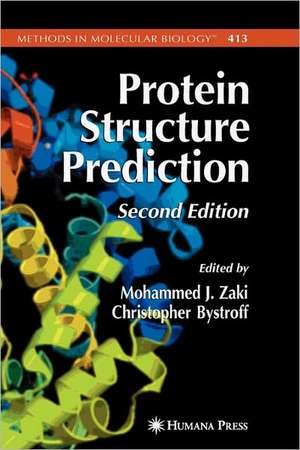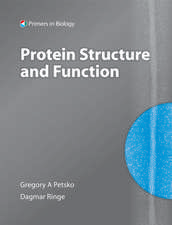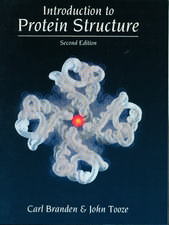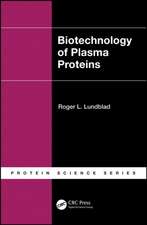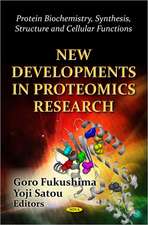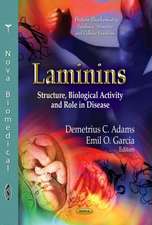Protein Structure Prediction: Methods in Molecular Biology, cartea 413
Editat de Mohammed Zaki, Chris Bystroffen Limba Engleză Paperback – 19 noi 2010
| Toate formatele și edițiile | Preț | Express |
|---|---|---|
| Paperback (1) | 941.79 lei 6-8 săpt. | |
| Humana Press Inc. – 19 noi 2010 | 941.79 lei 6-8 săpt. | |
| Hardback (1) | 953.52 lei 6-8 săpt. | |
| Humana Press Inc. – 12 sep 2007 | 953.52 lei 6-8 săpt. |
Din seria Methods in Molecular Biology
- 9%
 Preț: 791.63 lei
Preț: 791.63 lei - 23%
 Preț: 598.58 lei
Preț: 598.58 lei - 20%
 Preț: 882.98 lei
Preț: 882.98 lei -
 Preț: 252.05 lei
Preț: 252.05 lei - 5%
 Preț: 802.70 lei
Preț: 802.70 lei - 5%
 Preț: 729.61 lei
Preț: 729.61 lei - 5%
 Preț: 731.43 lei
Preț: 731.43 lei - 5%
 Preț: 741.30 lei
Preț: 741.30 lei - 5%
 Preț: 747.16 lei
Preț: 747.16 lei - 15%
 Preț: 663.45 lei
Preț: 663.45 lei - 18%
 Preț: 1025.34 lei
Preț: 1025.34 lei - 5%
 Preț: 734.57 lei
Preț: 734.57 lei - 18%
 Preț: 914.20 lei
Preț: 914.20 lei - 15%
 Preț: 664.61 lei
Preț: 664.61 lei - 15%
 Preț: 654.12 lei
Preț: 654.12 lei - 18%
 Preț: 1414.74 lei
Preț: 1414.74 lei - 5%
 Preț: 742.60 lei
Preț: 742.60 lei - 20%
 Preț: 821.65 lei
Preț: 821.65 lei - 18%
 Preț: 972.30 lei
Preț: 972.30 lei - 15%
 Preț: 660.49 lei
Preț: 660.49 lei - 5%
 Preț: 738.41 lei
Preț: 738.41 lei - 18%
 Preț: 984.92 lei
Preț: 984.92 lei - 5%
 Preț: 733.29 lei
Preț: 733.29 lei -
 Preț: 392.60 lei
Preț: 392.60 lei - 5%
 Preț: 746.26 lei
Preț: 746.26 lei - 18%
 Preț: 962.66 lei
Preț: 962.66 lei - 23%
 Preț: 860.22 lei
Preț: 860.22 lei - 15%
 Preț: 652.64 lei
Preț: 652.64 lei - 5%
 Preț: 1055.50 lei
Preț: 1055.50 lei - 23%
 Preț: 883.87 lei
Preț: 883.87 lei - 19%
 Preț: 491.89 lei
Preț: 491.89 lei - 5%
 Preț: 1038.86 lei
Preț: 1038.86 lei - 5%
 Preț: 524.16 lei
Preț: 524.16 lei - 18%
 Preț: 2122.34 lei
Preț: 2122.34 lei - 5%
 Preț: 1299.23 lei
Preț: 1299.23 lei - 5%
 Preț: 1339.12 lei
Preț: 1339.12 lei - 18%
 Preț: 1390.26 lei
Preț: 1390.26 lei - 18%
 Preț: 1395.63 lei
Preț: 1395.63 lei - 18%
 Preț: 1129.65 lei
Preț: 1129.65 lei - 18%
 Preț: 1408.26 lei
Preț: 1408.26 lei - 18%
 Preț: 1124.92 lei
Preț: 1124.92 lei - 18%
 Preț: 966.27 lei
Preț: 966.27 lei - 5%
 Preț: 1299.99 lei
Preț: 1299.99 lei - 5%
 Preț: 1108.51 lei
Preț: 1108.51 lei - 5%
 Preț: 983.76 lei
Preț: 983.76 lei - 5%
 Preț: 728.16 lei
Preț: 728.16 lei - 18%
 Preț: 1118.62 lei
Preț: 1118.62 lei - 18%
 Preț: 955.25 lei
Preț: 955.25 lei - 5%
 Preț: 1035.62 lei
Preț: 1035.62 lei - 18%
 Preț: 1400.35 lei
Preț: 1400.35 lei
Preț: 941.79 lei
Preț vechi: 1148.52 lei
-18% Nou
Puncte Express: 1413
Preț estimativ în valută:
180.27€ • 195.88$ • 151.52£
180.27€ • 195.88$ • 151.52£
Carte tipărită la comandă
Livrare economică 21 aprilie-05 mai
Preluare comenzi: 021 569.72.76
Specificații
ISBN-13: 9781617377570
ISBN-10: 1617377570
Pagini: 337
Ilustrații: XII, 337 p. 69 illus.
Dimensiuni: 155 x 235 x 19 mm
Greutate: 0.49 kg
Ediția:Softcover reprint of hardcover 2nd ed. 2008
Editura: Humana Press Inc.
Colecția Humana
Seria Methods in Molecular Biology
Locul publicării:Totowa, NJ, United States
ISBN-10: 1617377570
Pagini: 337
Ilustrații: XII, 337 p. 69 illus.
Dimensiuni: 155 x 235 x 19 mm
Greutate: 0.49 kg
Ediția:Softcover reprint of hardcover 2nd ed. 2008
Editura: Humana Press Inc.
Colecția Humana
Seria Methods in Molecular Biology
Locul publicării:Totowa, NJ, United States
Public țintă
ResearchCuprins
Preface.- Contributors.- I: Overview of Protein Structure Prediction.- A Historical Perspective of Template-Based Protein Structure PredictionJun-tao Guo, Kyle Ellrott, and Ying Xu.- The Assessment of Methods for Protein Structure PredictionAnna Tramontano, Domenico Cozzetto, Alejandro Giorgetti, and Domenico Raimondo.- II: Template-based Methods.- Aligning Sequences to StructuresLiam James McGuffin.- Protein Structure Prediction Using ThreadingJinbo Xu, Feng Jiao, and Libo Yu.- III: Structure Alignment and Indexing.- Algorithms for Multiple Protein Structure Alignment and Structure-Derived Multiple Sequence AlignmentMaxim Shatsky, Ruth Nussinov, and Haim J. Wolfson.- Indexing Protein Structures Using Suffix TreesFeng Gao and Mohammed J. Zaki.- IV: Protein Features Prediction.- Hidden Markov Models for Prediction of Protein FeaturesBystroff and Krogh.- The Pros and Cons of Predicting Protein Contact MapsLisa Bartoli, Emidio Capriotti, Piero Fariselli, Pier Luigi Martelli, and Rita Casadio.- Road Map Methods for Protein FoldingMark Moll, David Schwarz, and Lydia E. Kavraki.- Scoring Functions for De Novo Protein Structure Prediction RevisitedShing-Chung Ngan, Ling-Hong Hung, Tianyun Liu, and Ram Samudrala.- Protein--Protein Docking: Overview and Performance AnalysisKevin Wiehe, Matthew W. Peterson, Brian Pierce, Julian Mintseris, and Zhiping Weng.- Molecular Dynamics Simulations of Protein FoldingAngel E. Garcia.
Textul de pe ultima copertă
For forty years we have known the essential ingredients for protein folding – an amino acid sequence, and water. But the problem of predicting the three-dimensional structure from its sequence has eluded computational biologists even in the age of supercomputers and high throughput structural genomics. Despite the unsolved mystery of how a protein folds, advances are being made in predicting the interactions of proteins with other molecules, such as small ligands, nucleic acids or other proteins. Protein Structure Prediction focuses on the various computational methods for prediction, their successes and their limitations, from the perspective of their most well-known practitioners. Leaders in the field provide insights into template-based methods of prediction, structure alignment and indexing, protein features prediction, and methods for de novo structure prediction. Protein Structure Prediction is a cutting-edge text that all researchers in the field should have in their libraries.
Caracteristici
Describes cutting-edge techniques for prediction and accesses them from the perspective of their most well-known practitioners Includes a comprehensive account of the history of protein structure prediction Step-by-step, readily reproducible laboratory protocols Chapters written by experienced practitioners
